Captain Fantastic subtitled in French
Interview with Matt Ross and Anaïs Duchet
Captain Fantastic (2016), American actor Matt Ross’s second feature, is an unusual film, especially in its very original dialogue mixing languages registers, cultural references and ways of expressing themselves by three generations of characters. Anaïs Duchet, who wrote the French subtitles for the film, suggested the following interview between the filmmaker and herself, which was done by email in early 2017.
Matt Ross, what is your relationship to foreign languages?
Matt Ross: I’ve studied French, Italian and German and I lived in Italy for one year. Probably half the films I watch are foreign films.
As a moviegoer, what is your take on subtitles and dubbing?
Matt Ross: The US doesn’t have a tradition of dubbing, so it’s only really an issue when I’m in France or Italy. And there, if I have a choice, I’d always choose a subtitled film over one that’s dubbed.
In terms of subtitling, I understand that many people don’t want to read while watching a film and it certainly changes the way one views a film, as it can make it difficult to simply let the images wash over, but I always want to hear the original actors. I think their depth and nuance cannot ever truly be replicated.
The other issue, of course, is the quality of the subtitling, which varies, and the fact that you can’t possibly translate every single word. So there is an editing going on, a distillation. But I still contend that subtitling is a far better way to watch a film in another language than dubbing.
From your point of view, what were the stakes of translating the film into French?
Matt Ross: Captain Fantastic’s first showing in a non-English speaking territory was at the Cannes Film Festival [in 2016] and the first – and only – contact I had personally with the people who translated the film into another language was with the French translator, Anaïs Duchet.
France is a large and important territory – and Cannes is obviously a very important venue, where a large international audience would see the film for the first time. I wanted the translation to be excellent, for those reasons alone.
But also – and this may be unique to this film – the family in the film speaks in a very specific way, they live in an isolated manner, are highly educated, and are therefore unusually, even hyper, articulate. It was important to me that the translation communicated these nuances.
Anaïs Duchet, what were the conditions in which you subtitled this film?
Anaïs Duchet: Catherine Aubert, the technical director of Mars Films, entrusted me with the subtitling of the film. The deadline was relatively short (if I remember correctly, about ten days before the first simulation of the subtitled version) because Mars wanted the Cannes selection committee, who had already seen and liked the film, to be able to see it again subtitled in French to confirm their decision to select it.
It was early April. Fortunately, the film was completely finished because it had been screened at the Sundance Film Festival in January, so I didn’t have the additional difficulty of working on new edits or an unfinished mix.
After the simulation and exchanging ideas with Matt Ross, we organized several trial screenings on a large screen and polished the last few details with the technical director. It’s something I’d never had the opportunity to do with other distributors and I think seeing the film with its subtitles in real-life conditions is an essential part of the process, particularly for the sound quality because sometimes certain lines which seem barely audible in subtitling software which uses very low resolution video (mpeg-1) can turn out to be clearly audible in a theatre.
What did you know about Matt Ross and how did you immerse yourself in the film’s specific atmosphere?
Anaïs Duchet: I didn’t know Matt Ross’s work as a director, because he’d only directed one feature film before, 28 Hotel Rooms, which wasn’t released in France and is very hard to find. But I realized that I’d seen him act in films such as Aviator [Martin Scorsese, 2004] or Good Night, and Good Luck [George Clooney, 2005]. I saw that he played a recurrent role in the series Silicon Valley. So, I later watched a few episodes and I found him extremely funny and surprisingly credible, cast against type as a bad guy. You could see he had a lot of fun doing it.
I discovered Captain Fantastic the way you should always discover films: without knowing almost anything about the story nor having read the reviews from Sundance. In other words, free from any preconceived ideas or expectations, which lets you be more easily carried along and taken by surprise. And I certainly was. I remember thinking that a director who had chosen to tell a story like that, with those references, had to be unusual in American cinema, someone who uses his mind, and that parts of this story had to be based on personal experience.
The importance of words
Obviously, the dialogue plays a pivotal role in this film, giving each character a different tone, different intentions, different social or educational backgrounds, and establishes the different natures or levels of relationships between the characters. How did you go about this writing process? Matt Ross, did you have to go through many drafts?
Matt Ross: Yes, ideally, just like in life, each character should have their own “voice”, their own specific way of speaking. I’m aware of this, but rarely have to monitor it, or go back and make those kinds of corrections. Once I find each character’s distinct voice, writing them seems to flow organically.
In terms of drafts, I usually write about six drafts before I give the script to my producer. Then after her notes, there are usually a few more, from the lead actor, for instance. In this case, Viggo Mortensen [Ben], had ideas and there were a few more drafts for him. And I also did some additions for Frank Langella [Jack, the grandfather] as well. But each film is different.
Over many years of writing, I have collected a select group of friends who read my early work and are instrumental in helping my progress. Writing is re-writing and until the ADR1 is recorded, it continues to the very end.
During the fight between Ben and his sister Harper, Ben tells her, “They’re just words. Your words, but just words”. And Ben asks his younger daughter Zaja to explain the Bill of Rights “in [her] own words”. Was it important for you to stress, in the movie itself, this attention to words?
Matt Ross: Yes, absolutely. Personally, I love language and am obsessed with words. And this is a family that cares deeply about both. They cherish words and language, the nuance and poetry and subtlety of them, and also care about proper grammar.
Words and word choice matters. These characters care about expressing themselves in the deepest way possible and the ability to express precisely what you mean, to do so with elegance and specificity, is part of their culture and their world. As it is part of mine.
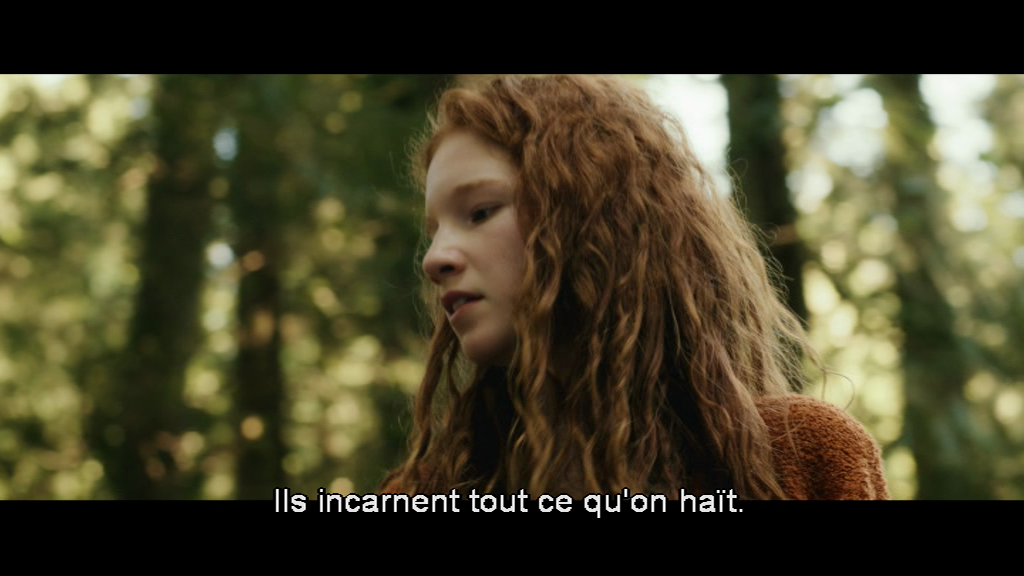
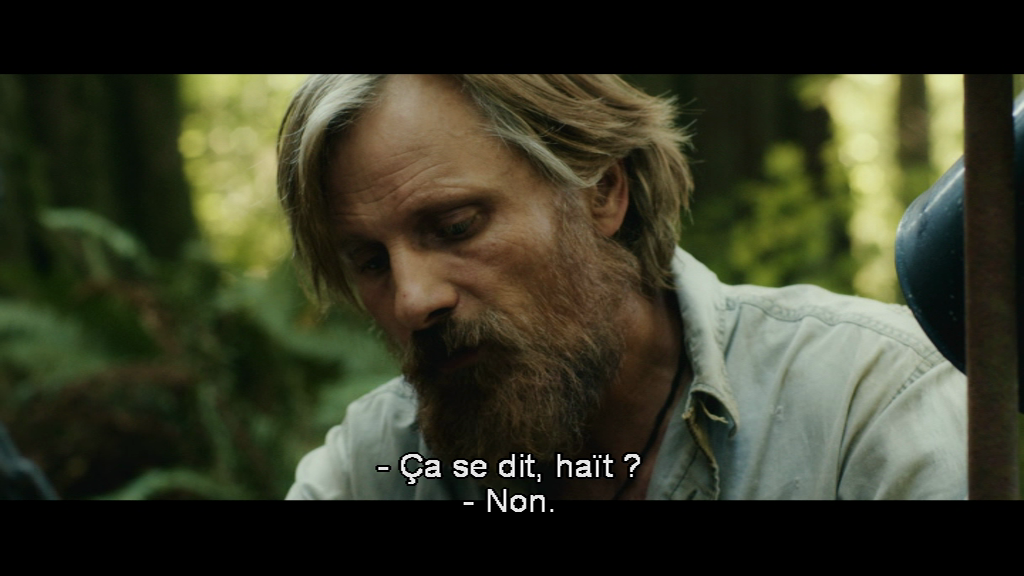
Would you say that one of the film’s messages is the power of language as a weapon, a social and intellectual tool, and sometimes a marker that can “lock” you in a box or a stereotype?
Matt Ross: The truth is that I wasn’t conscious of delivering this message and certainly hadn’t thought of language as a weapon. However, Ben is able to counter his sister and brother-in-law’s arguments very well and encourages language as a weapon of sorts when he invites Zaja to recite and dissect the Bill of Rights. But I agree that language is a tool. And that one’s ability with language, or lack thereof, can frequently indicate ones “class” or “caste”.
Cultural references
When choosing its cultural references, to what extent did you imagine an “ideal viewer” for this film? For instance, the books that the children read are chosen carefully (their titles can easily be read on screen and there is enough time for them to be subtitled), and so are prominent figures like Noam Chomsky. At that point, did you already think about potential international distribution and the possibility that some references might be lost on foreign audiences? Or, on the contrary, that some references would particularly speak to them? For instance, Noam Chomsky is well-known in France.
Matt Ross: I don’t think in terms of “ideal viewer”. If there is some possible audience that I write for, it would be my friends, the people I know and love. But even that is very vague. I certainly don’t do it consciously. On some level, I write the film I’d want to see, I suppose.
The children read books that I love, that are, or were, important to me. Or they are books that I thought the father would wish them to read. I didn’t think about international distribution or worry that foreign audiences might not know some of them. They’re true to these people and that was all that mattered to me.
And the same is true of Noam Chomsky. He may be well-known in France, but I chose him because his work has had a profound effect on me personally. I think he’s an important and admirable American, worthy of celebration, and his work should be read in every school in the US.
Anaïs, you only translated the start of the song “Sweet Child O’ Mine”. Why was that?
Anaïs Duchet: I suggested this solution to Catherine Aubert of Mars Films. From the first viewing, it seemed logical to me (whereas it’s often a difficult choice to make): the song begins slowly, a cappella, with sufficiently long shots to make the subtitles pleasant to read. After the first chorus when the instruments kick in, the delivery and editing speed up, the scene becomes more animated, and I thought the audience should be able to enjoy it, especially as the lyrics aren’t as essential to the plot as they are in a musical. We could have decided not to translate anything, but I felt – and I might be wrong – that it was necessary.
Foreign languages in the film
On the bus where the family lives, nicknamed “Steve”, when the girls speak Esperanto and Ben replies in other languages, was it your choice not to subtitle into English the German and Mandarin spoken by Ben, implying that we should understand them or at least identify them, just like his daughters are supposed to?
Matt Ross: It was my choice not to use subtitles there, but I wasn’t thinking in those terms. It just seemed pointless to do so. The point isn’t what he’s saying, but the fact that they all speak many languages. If someone speaks German or Mandarin, all the better, but I don’t think it’s necessary to understand or enjoy the moment.
How did you go about the writing of those specific lines?
Matt Ross: We hired Esperanto experts/teachers to re-write the Esperanto that I had written in the script and to work with Sami Isler (Kielyr) and Annalise Basso (Vespyr). Very few people in the world actually speak Esperanto, but I wanted to make sure that those who do would see it portrayed accurately. The Esperanto experts/teachers were very happy about this and helped us tremendously.
We also had a native Mandarin speaker work with Viggo Mortensen for the Mandarin. For the German, I consulted with a German friend. While filming, Viggo also did variations in French, Spanish, and Catalan, but those didn’t make the final cut.
Levels of language
Matt Ross, how do you go about the use of bad/strong language which could lead to restrictions in your film’s authorized viewership in countries like the US, the UK or Australia?
Matt Ross: “Bad/strong” language will determine the rating. Which can affect box office. But the honest answer is that I don’t worry about that at all when I’m writing. I only worry about truth and authenticity.
It is sad to me that in many countries, the US included, “bad” words are vilified. Honestly, by making them forbidden, we give them unnecessary power. It’s so silly. They’re tools, to be used for emphasis or drama or humor – nothing more.

Anaïs Duchet, how did you decide to use “tu” and “vous” in the subtitles of Captain Fantastic? Jack says the informal “tu” to Ben who says “vous” to him, for example. One might think that Ben would tend to say “tu” to everyone!
Anaïs Duchet: Ben has a natural, fraternal side to him, it’s true, but he is also well educated and he respects certain social codes. Several reasons led me to opt for the “vous”: above all, it’s the fact that among my friends and family, this asymmetrical “tu”/“vous” seems to be the most common practice with in-laws, for my generation and in my sociocultural context, because you always put more of yourself than you realize in your translation choices! In more traditional or wealthy settings, the tendency is more for a reciprocal “vous”. And in contexts where relations are less hierarchical, you tend to find a reciprocal “tu”. I made this choice, because Ben and Jack are at daggers drawn and because I didn’t feel Ben was particularly familiar. What’s more, he married Jack and Abby’s daughter before making this radical life choice, so we can maybe imagine he was more conventional before.
Over the course of our exchanges, Matt Ross asked me about this choice. Explaining social codes, the configurations and all the possible connotations behind “tu”/“vous” is always an uphill struggle, but luckily he seemed convinced by my arguments.
Similarly, he was initially surprised that I chose to have the children address their grandparents as “grand-père” (grandfather) and “grand-mère” (grandmother) rather than “papy” (grandpa) and “mamie” (grandma), but I thought that the latter terms were too affectionate for the limited relations the children have with them. It could be a deliberate distancing by the father who had “dictated” these more neutral terms, because in the grandparents’ absence, the parents would have decided that these people be called “grand-père” and “grand-mère”.
Are there any particular difficulties in translating dialogue spoken by children?
Anaïs Duchet: I think it’s essentially the quality of the writing and the naturalness of the original dialogue which mean that the translation stands a chance of sounding natural, too.
These children may have a more elaborate language than their peers, but they still have an innocence and spontaneity that you must convey, even though it comes through in the acting and the voices. For example, for the line “It’s that sick sense of entitlement that these people have”, I chose to stress a more natural side with simpler words in French: “Ces gens se croient tout permis” (“These people think they can get away with anything”) or “Ils veulent faire la loi” (“They want to lay down the law”) because the meaning is the same. Not to mention that it’s in writing and that a more technical expression to stick closer to the English such as “ces gens ont l’assurance de leur classe” (“these people have the assurance of their class”) would have sounded pompous, as well as omitting the pejorative, familiar aspect provided in English by “sick”.
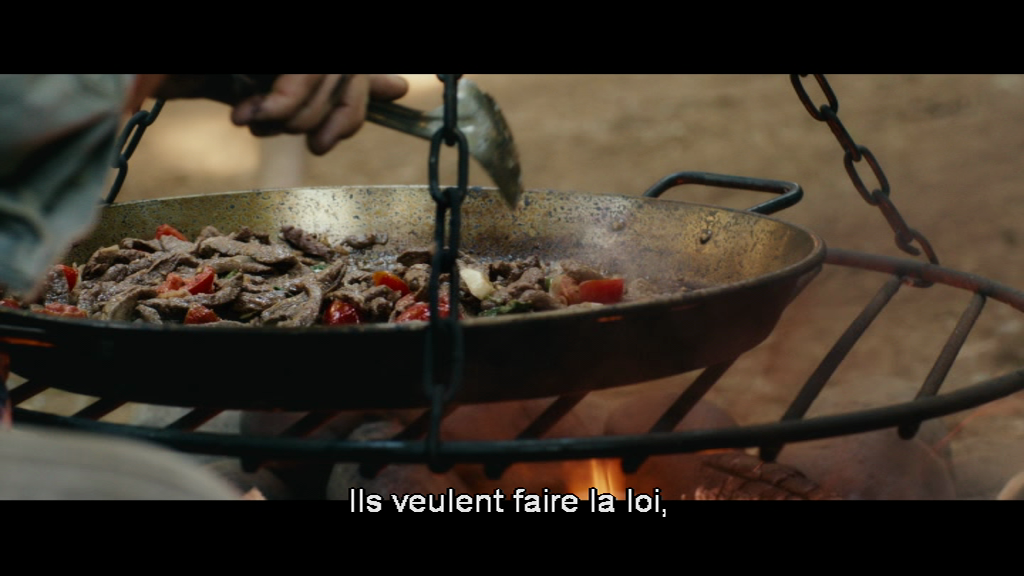
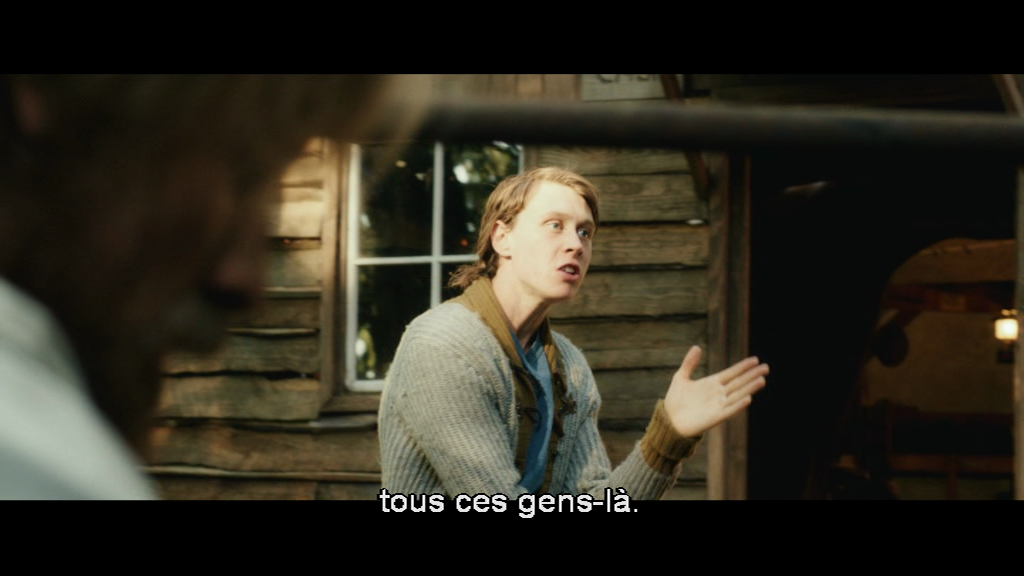
The film’s title
Matt Ross, did you have a say in the film’s foreign titles, and did you wish to keep the original title as much as possible? Do distributors take the director’s opinion into account, or does it depend on the country or the distributor?
Matt Ross: I did have a say and I very much wanted to retain the original title. A few territories asked to change the title, for various reasons, but I found that all the distributors were open to my reasoning as to why I wished to retain the original title. In the end, I only agreed to allow this in Japan. The Japanese were very clear that for cultural reasons they believed that the title needed to be changed and out of respect for a culture that is not my own, I agreed.
In Quebec, where titles are always translated, the title is Une vie fantastique. What do you think of it?
Matt Ross: That’s the first I’ve heard of it. It’s not terrible or offensive. When I mentioned this to my 9-year old son2, he laughed and said, “I’m not sure they understood what the title was supposed to mean.”
Regardless, I just think it’s inferior to Captain Fantastic. In my opinion, it’s more bland, generic, and says much less about the tone of the film. And of course, doesn’t include a reference to the main character, nor ask the question, “Is he or is he not?”
Didn’t you fear that the title would deceive people as to the film’s genre and storyline, or might be lost on the audience? Did you consider other titles?
Matt Ross: I certainly didn’t wish to deceive anyone, nor did I fear that we might, but I was certainly aware that US cinema is entirely dominated by superhero films, unfortunately, and that, without context, it might sound like one. Ultimately, given the marketing materials, I trusted people’s intelligence to understand the genre and tone. But I also understand that it’s true that the title is only really understood AFTER seeing the film.
For me, Captain Fantastic is a deeply meaningful title, it’s lyrical, playful, and has mystery. And more than anything, it asks a question that gets at the heart of the film. The US distributor asked me to consider other titles and we went through hundreds of other possibilities. In the end, I preferred taking the chance with something that was all the things I mentioned, rather than going with something generic.
An unusual co-operation
Can you tell us about your exchanges with Anaïs Duchet on the preparation of the French subtitles?
Matt Ross: Mars, the French distributor, hired Anaïs and her first pass was exceptional. Viggo Mortensen and I speak French (he better than I) and we both had only a few suggestions. I also have a very close French friend, who has lived in the US for 20 years. He looked it over and we discussed the way Anaïs had translated certain ideas.
I asked if I could speak with her, not because her work wasn’t excellent, but because I wanted to have a dialogue about the nuance of certain moments. We spoke once and then had an on-going email conversation.
I remember asking about the translation of the sentence, “Don’t talk to us like we’re your inferiors”, which in French was translated as “Don’t be condescending.” I assumed that particular translation was too literal and lost the humor of the original, but Anaïs’s translation turned out to be absolutely correct.
Anaïs Duchet: During the scene when they come out of church, Ben goes over to the grandmother, Abby, takes her by the shoulders, and says to her in a serious tone: “I’m sorry.” My initial intuition was to write “Pardon”, then I had doubts about the meaning of this sentence. I asked Matt Ross if it meant “My condolences” or “Sorry for disturbing the ceremony”.
My question threw him and he admitted he hadn’t thought about the ambiguity of the meaning as this scene had been improvised by Viggo Mortensen. He considered it and said that insofar as it was possible, he would like to keep the two meanings. As I’m allergic to “Je suis désolé”, which often tends to be too literal, because it sounds like a badly dubbed line, I opted for the slightly more solemn “Je suis navré” which partly conveys the ambiguity, even if it leans more towards apologies than condolences.
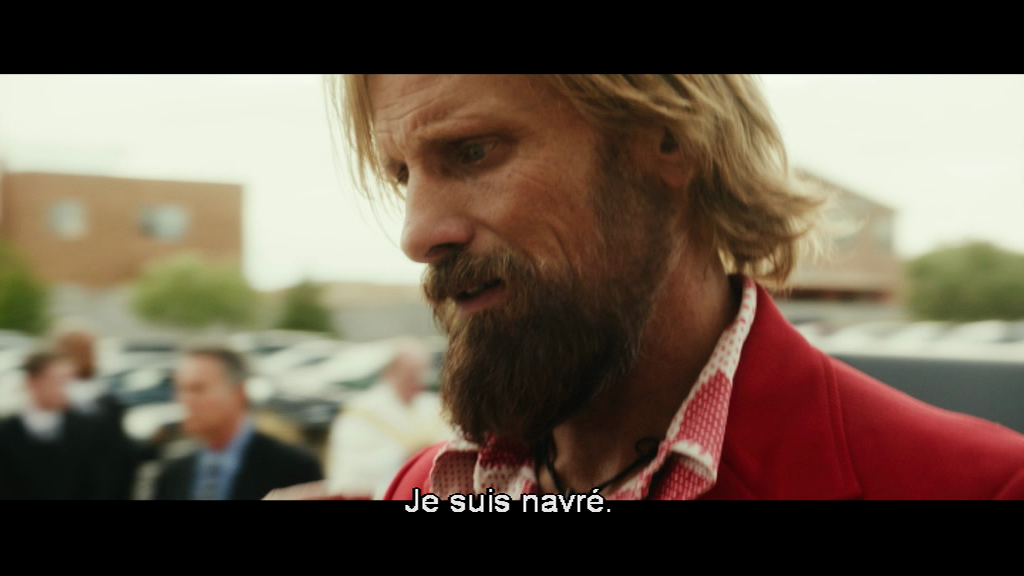
Matt Ross: At the end, at the funeral pyre, Ben refers to his wife as “Little Bird”. We also discussed how best to translate this, whether in French it should be “dove” or something else.
Anaïs Duchet: I started by translating it as “petite fleur” (“little flower”). During the simulation, we replaced it with “ma douce colombe” (“my sweet dove”) as it seemed preferable to keep the metaphor of a bird. But in the notes Matt Ross later sent, he specified that I should favor the idea of the bird’s frailty rather than its gentleness. One of his proposals was “petit oiseau” (“little bird”), so I had to explain that “petit oiseau” had a very different connotation in French [“penis” in child talk]! The other was “moineau” (“sparrow”) which is closer but that I preferred to replace with a feminine word. So, we agreed on “hirondelle” (“swallow”).
What conclusions do you draw from such exchanges?
Matt Ross: I loved this back-and-forth, as it was fascinating, but also because it allowed me to really discuss, in detail, what I hoped to communicate and know that my intentions would be preserved.
In truth, the subtitler has the power to illuminate or obfuscate the spoken language. And so I was extremely fortunate to get Anaïs, someone who understood, on a deep level, the film and its intentions.
Anaïs Duchet: Having the writer carefully proofread the subtitles and knowing his original intentions made me reconsider subtitles which I might not otherwise have returned to over and over, about which I had maybe “capitulated” a bit too fast in the face of the technical constraints.
Faced with the question “Why didn’t you translate this aspect, this word or this sentence more precisely, more literally or more fully?”, if the easy (and admittedly often justified) answer is: “There’s no room”, looking at the problem with fresh eyes sometimes opened up new solutions which better rendered the spirit or the letter.
It also showed me that the priorities I’d set as to what information to retain in the subtitles weren’t necessarily the same as the author’s. In the end, a turn of phrase, a word or a subtext I’d left aside due to lack of space took on all its importance when I became aware of the fact that everything in the text had been written for a reason.
Having to justify your translation choices may seem an unpleasant exercise at first, but when you’re dealing with someone as benevolent as Matt Ross, it just encourages you to raise your game a bit more.
Matt Ross, were you in contact with translators of the films into languages other than French?
Matt Ross: Viggo Mortensen read and gave notes – through the foreign sales agents – on the Spanish, Danish, and Catalan subtitle translations, as he speaks those languages. Otherwise, we had no more contact with any of the other translators.
Personally overseeing every translation would be impossible, of course. But the choice of words matters and when I’m not part of the conversation, I’m really just sort of hoping that the individual translators understood my intentions. I can only imagine that the conversations I had with Anaïs could very well have been had in every language. Without them, something invaluable is lost in translation.
This interview was conducted through an exchange of emails in January and February 2017. John Miller (Asif) translated Anaïs Duchet’s original French replies into English.
